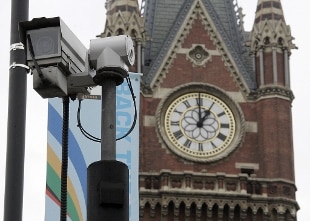- Facial recognition, parliamentary question to the government and interior minister
- EU, the White Paper on Artificial Intelligence arrives: moratorium on facial recognition
- China, facial recognition companies enter Trump's 'blacklist'
- Brad Smith at Rainews24: "Technology needs ethics and investment in training"
Share
by Celia Guimaraes 25 January 2020 London Metropolitan Police (MET) will begin using cameras for face recognition live on the streets of London next month.The Guardian revealed it, stressing that the news raised skepticism among experts on the efficiency of the system and strong concerns by civil rights associations.
The Met, however, rejects the objections and says that 80% of the citizens interviewed support the decision. The system, they argue, aims to catch dangerous criminals and track down missing people.
Police added that they will implement facial recognition technology live openly and only after consulting the communities in which it will be used.
#WATCH | this video which highlights how Live Facial Recognition technology will be used to help us bear down on serious violence and keep people safe in #London
More info 👉 https://t.co/ZhhNeJPHT5 https://t.co/tIXGL9bRQL pic.twitter.com/MJaMEB3uAD
Looks like 'Person of Interest'
The cameras will be connected to a suspect database, loaded with the latest information. If the system detects someone who is not in the database, the information will be cleared in a few seconds. But if the system launches an alert for a wanted subject, an agent will go to talk to him.
However, civil liberties groups such as Big Brother Watch immediately promised battle in British courts to try to block the initiative before the metropolitan police can implement the system.
The system somehow recalls the plot of the TV series 'Person of Interest', by CBS, aired between 2012 and 2016, where a software of the federal government, known as "The Machine", is able to collect data from multiple sources of information, to predict and identify people who plan terrorist acts.
Clearview AI, 'steals' from social media and sells to the police
Another element of debate about facial recognition technologies is the case of the obscure company Clearview AI, revealed by the New York Times reporter Kasmir Hill:
The privacy paranoid among us have long worried that all of our online photos would be scraped to create a universal face recognition app. My friends, it happened and it's here: https://t.co/qfv5b27mzg
- Kashmir Hill (@kashhill) January 18, 20203 billion photos 'scratched away' from social media
In Italy, the analyst Vincenzo Cosenza also highlights the story of "Hoan Ton-That, an obscure developer and his company Clearview AI, who used scraping techniques to collect billions of photos and information from the web. He then indexed and he sold them to law enforcement agencies around the world (also to Italy?) ".
"This way agents can upload a photo and thanks to facial recognition try to get more information about that person." And he adds: "Facial recognition has been used by police in the United States for 20 years. But here we are talking about 3 billion photos against the 411 million of the FBI database, the 47 million of the Florida police and the 8 million of that of Los Angeles. "
Also in Italy?
Vincenzo Cosenza and the Italian parliament ask for it, with a question to the Council of Ministers and the Minister of the Interior , presented in recent days. Formally, recalls Cosenza, "Facebook and the company prohibit scraping" - the theft of photos posted on social networks - but it has already happened, in the United States, "that LinkedIn lost a lawsuit against hiQ Labs Inc. because such a ban would constitute an information monopoly , contrary to the free market ".
And in the name of the free market, Clearview AI, "company financed by Peter Thiel" (co-founder of PayPal and Palantir Technologies, among other companies, ed.), Was born and thrives, stresses The Next Web. And that, in addition to having a huge database , it also boasts the possibility of recognizing faces even imperfect photos, such as those taken 'crooked' or from above - think - like a surveillance camera.

